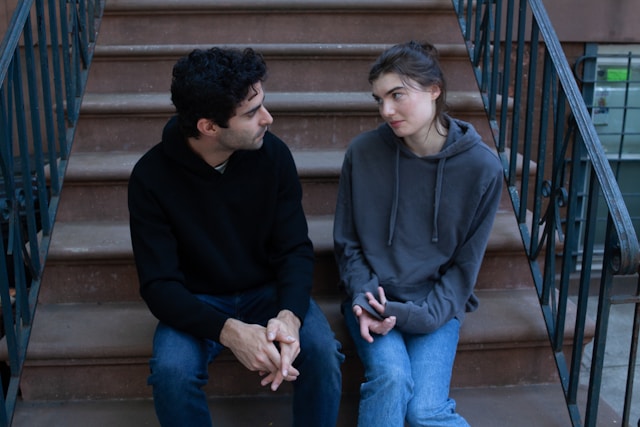Leaving a toxic relationship should be simple, at least in theory.

Unfortunately, in reality, it’s often anything but. Whether it’s romantic, familial, or a long-standing friendship, something about walking away feels harder than it logically should. You know you’d be better off without them and that having this person in your life isn’t doing you any favours, but cutting them off feels nearly impossible. Here’s why it’s so tough to cut ties with someone who’s hurting you, even when you know you need to.
1. You’re still clinging to who they used to be.

In many toxic relationships, there was a time when things felt good, maybe even great. That version of the person sticks in your mind, and it becomes easy to convince yourself that if you just hang on a bit longer, that side of them will come back. However, holding onto old memories can blind you to how much things have changed. The gap between who they were and who they are now can be painful to face, so it’s easier to wait and hope instead of walking away.
2. You feel responsible for their well-being.

If someone has leaned on you heavily—emotionally, financially, or otherwise—it’s easy to feel like you’re abandoning them by leaving. Toxic people often feed into this guilt by acting helpless or making you feel like their stability depends on you. Of course, the truth is, you’re not responsible for fixing someone else’s life. That weight doesn’t belong to you. And staying out of obligation won’t heal them—it’ll just drain you.
3. You’re scared of what happens next.

Even a bad relationship can feel more comfortable than the unknown. The idea of being alone, starting over, or confronting your own grief can feel overwhelming, especially if you’ve wrapped your identity around this connection for a long time. That fear of the next chapter can keep you stuck in one that’s already hurting you. However, fear doesn’t mean you’re making the wrong choice—it just means the choice is real, and it matters.
4. They’ve worn down your self-worth.

Toxic people rarely leave your confidence intact. As time goes on, they destroy how you see yourself—making you feel like you’re the problem, or that you’re lucky they’ve stuck around. It’s manipulative, but it works. When you start to believe you don’t deserve better, leaving stops feeling like a right and starts feeling like a risk. That’s not weakness—that’s a symptom of long-term emotional erosion.
5. There were just enough good moments to confuse you.

Toxic relationships often run on a cycle—kindness, cruelty, apology, repeat. The brief highs make you question whether things are really as bad as they seem. One sweet moment can make a month of damage feel like an exception instead of a pattern. That emotional whiplash is designed to keep you off balance. It’s hard to leave when you’re constantly questioning your own perception of what’s happening.
6. You’re worried no one else will understand.

If you’ve confided in other people, and they’ve dismissed your experience—or worse, sided with the toxic person—it can make you feel isolated and doubted. That makes it harder to speak up again, or even trust your own instincts. When the people around you don’t get it, staying starts to feel like the path of least resistance. However, their confusion doesn’t make your pain any less real. It just means you may need to find support in different places.
7. You’ve built a life around them.

Sometimes leaving doesn’t just mean cutting off one person—it means changing your routine, your social circle, your finances, your sense of home. That kind of disruption can feel impossible to face, especially when you’re already emotionally exhausted. However, no matter how entangled your life has become with theirs, you’re still allowed to untangle it. It might be messy. It might take time, but staying because it’s convenient is still a kind of loss.
8. They keep making promises.

Toxic people often say exactly what you need to hear, especially when they feel you pulling away. They might promise to change, go to therapy, treat you better—and for a moment, you believe it. Because you want to. However, real change takes time and consistency—not just apologies and nice words. If their behaviour doesn’t change alongside their promises, it’s not growth. It’s another loop meant to pull you back in.
9. You don’t want to feel like you “gave up.”

When you’ve invested time, energy, and love into someone, it’s painful to walk away. It can feel like failure. Like all that effort didn’t mean anything. And if you’ve been told that leaving is the same as quitting, that feeling gets even louder. However, walking away isn’t giving up—it’s choosing to stop pouring into something that keeps running dry. Letting go can be one of the strongest things you ever do, even if it doesn’t feel that way at first.
10. They’ve convinced you that you’re the problem.

Toxic people are often skilled at deflecting blame. Eventually, they may convince you that your reactions are overblown, your needs are unreasonable, or your feelings are too much. That gaslighting makes it incredibly hard to trust yourself.
If you’ve spent months—or years—trying to “be better” just to make the relationship feel bearable, it’s no wonder you doubt whether leaving is justified. However, if you’ve been constantly shrinking to keep the peace, that peace was never mutual.
11. You’re trying to protect other people from the fallout.

In some cases, staying means shielding other people—children, relatives, mutual friends—from the emotional blowback. You worry about what the toxic person will do if you leave, or how it’ll affect people around you. That’s a heavy burden to carry, and it’s rooted in compassion, but your wellbeing matters, too. You don’t have to be the buffer forever. Sometimes walking away is the very thing that protects other people in the long run.
12. You keep waiting for the right time.

When things are toxic but not explosive, it’s easy to put off leaving. You tell yourself you’ll wait until things get worse, or until there’s a clearer reason, or until you feel stronger. However, sometimes there is no “perfect” exit point. Waiting for the tipping point can keep you stuck for years. If you’re constantly drained, hurt, or walking on eggshells, that’s reason enough.
13. You’re emotionally worn down.

Toxic relationships drain your energy in slow, sneaky ways. The longer you stay, the harder it is to think clearly or act decisively. You might feel numb, detached, or too tired to make a plan—let alone follow through on it. This is one of the biggest traps of toxicity: it doesn’t just hurt you, it makes you too exhausted to leave. That’s why small steps matter. One call. One plan. One conversation with someone safe. That’s how you start regaining the energy to move.
14. You’ve attached your worth to being “loyal.”

Some people are raised to believe that walking away is betrayal. That real love means staying, no matter what. If you’ve tied your self-worth to how much you can endure, leaving feels like a failure of character. However, loyalty shouldn’t come at the cost of your well-being. Being kind, devoted, or forgiving doesn’t mean being someone’s emotional punching bag. True loyalty also includes loyalty to yourself.
15. You still love them.

This is maybe the hardest truth of all. You can love someone deeply and still know they’re not good for you. That love doesn’t vanish overnight, and it doesn’t make your decision any easier. The problem is, love alone isn’t enough to make a relationship healthy. You can love someone and still leave. You can wish them well and still protect yourself. Walking away isn’t proof you stopped loving them—it’s proof you finally started loving you, too.




